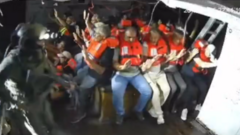Why Did Israel Intercept a Gaza-Bound Boat Carrying Food Aid?

Understanding the Recent Interception of Humanitarian Aid to Gaza
The recent incident involving the Handala, a vessel attempting to deliver humanitarian aid to Gaza, has sparked significant controversy and debate regarding international law, humanitarian efforts, and the ongoing Israeli-Palestinian conflict. According to the Freedom Flotilla Coalition (FFC), Israeli troops intercepted the boat in international waters, claiming it was attempting to breach the blockade of Gaza. The FFC reported that the Handala was carrying essential supplies, including baby formula, aimed at alleviating the humanitarian crisis in the region. This event highlights the complex dynamics surrounding humanitarian aid, international maritime laws, and the geopolitical tensions in the Middle East.
The Context of the Blockade on Gaza
The blockade of Gaza, enforced by Israel and Egypt since 2007, has created a dire humanitarian situation for the Palestinian population. Following Hamas's takeover of the region, restrictions on the flow of goods and services intensified, leading to widespread shortages of food, medical supplies, and other essential items. The blockade is justified by Israel as a necessary security measure, while critics argue it constitutes collective punishment against the civilian population.
The Incident Involving the Handala Vessel
On a recent mission, the Handala set sail with a crew of 19 activists and two journalists representing various countries, including Australia, France, the UK, and the US. Their goal was to deliver food aid to Gaza in defiance of the blockade. Video footage released by the FFC shows activists with raised hands as armed Israeli soldiers boarded the vessel, leading to claims that the crew had been "kidnapped." The Israeli military, meanwhile, stated that the boat was intercepted to prevent it from illegally entering the maritime zone off Gaza's coast.
Reactions to the Interception
The Israeli foreign ministry has defended its actions, labeling unauthorized attempts to breach the blockade as dangerous and unlawful. They emphasized that such missions undermine ongoing humanitarian efforts. The ministry stated that the Handala would be returned to the shores of Israel, assuring that all passengers were safe. In contrast, the FFC has called for international pressure on governments worldwide to sanction Israel for its actions, further complicating the narrative surrounding the incident.
The Humanitarian Crisis in Gaza
The humanitarian situation in Gaza has reached alarming levels. The ongoing conflict, exacerbated by the blockade, has resulted in severe shortages of food, clean water, and medical supplies. According to reports from the Hamas-run health authority, the death toll in Gaza has risen dramatically in recent weeks, with over 59,000 fatalities since the escalation of military actions in October 2023. This has led to widespread calls for international intervention and humanitarian aid.
International Response and Humanitarian Aid Distribution
In light of the crisis, Israel has attempted to manage aid distribution through the Gaza Humanitarian Foundation, which aims to ensure that assistance reaches those in need. However, this approach has faced criticism from various humanitarian organizations, including the UN. These groups argue that the new system violates fundamental humanitarian principles of neutrality, impartiality, and independence, thereby complicating the efforts to deliver aid effectively.
Historical Background of the Blockade
The blockade of Gaza has its roots in the political turmoil that followed the 2006 Palestinian legislative elections. After Hamas won the elections and subsequently ousted rival factions, Israel and Egypt instituted the blockade to limit Hamas's capacity to govern and militarize. This blockade has had profound effects on the Palestinian economy and social fabric, leading to widespread poverty and dependence on international aid.
Previous Attempts to Deliver Aid
The Handala is not the first vessel to face interception while attempting to deliver aid to Gaza. In June 2023, a yacht carrying 12 activists, including prominent climate activist Greta Thunberg, was similarly intercepted by the Israeli military. That mission also aimed to highlight the humanitarian crisis and deliver critical supplies. Israel's response to such missions has often been dismissive, framing them as publicity stunts rather than legitimate humanitarian efforts.
Media Coverage and Public Perception
The media's portrayal of these incidents plays a significant role in shaping public perception. Reports often focus on the dramatic nature of the interceptions, including video footage and statements from both sides. The narratives presented can vary widely, depending on the source, which can exacerbate existing biases and misunderstandings surrounding the Israeli-Palestinian conflict.
The Role of Social Media in Advocacy
Social media has become a powerful tool for activists and organizations like the FFC to raise awareness about the humanitarian situation in Gaza. Through platforms like Twitter, Facebook, and Instagram, they can share real-time updates, mobilize support, and pressure governments to take action. The viral nature of these campaigns can lead to increased visibility for the cause, but it can also attract backlash and criticism from opposing viewpoints.
Legal Considerations Surrounding the Blockade
The legality of the blockade and the interception of vessels attempting to breach it is a contentious issue in international law. Proponents argue that as a nation, Israel has the right to enforce its borders and ensure national security. Critics, however, contend that the blockade constitutes a violation of international humanitarian law, particularly in its impact on civilians and the denial of essential supplies.
The Debate on Humanitarian Access
The debate over humanitarian access to Gaza raises complex questions about the balance between national security and humanitarian principles. While Israel asserts its right to control access to its borders, humanitarian organizations emphasize the need for unfettered access to deliver essential aid to those in need. This dichotomy leads to ongoing tensions between security measures and the moral obligation to assist vulnerable populations.
Future Implications for Humanitarian Efforts
As the situation in Gaza continues to evolve, the implications for humanitarian efforts remain uncertain. The international community's response to incidents like the interception of the Handala will likely influence future interventions and aid delivery strategies. Increased awareness and advocacy can lead to pressure on governments to reevaluate their policies and promote a more humane approach to the crisis.
Conclusion: Navigating the Complexities of Humanitarian Aid
The interception of the Handala highlights the complexities surrounding humanitarian aid in conflict zones, particularly in regions like Gaza. As tensions continue to rise, the need for effective and lawful humanitarian interventions becomes increasingly urgent. Understanding the intricate dynamics at play is essential for fostering informed discussions and developing strategies that prioritize the welfare of affected populations. The international community must navigate these challenges with a commitment to humanitarian principles while addressing the underlying political issues that contribute to the ongoing crisis.
FAQs
What is the Freedom Flotilla Coalition (FFC)?
The Freedom Flotilla Coalition is an organization that seeks to challenge the blockade of Gaza by sending ships with humanitarian aid to the region. Their missions aim to raise awareness of the humanitarian crisis and advocate for the rights of Palestinians.
Why is there a blockade on Gaza?
The blockade on Gaza was instituted by Israel and Egypt following Hamas’s takeover of the region in 2007. It is justified by Israel as a security measure to prevent arms smuggling and attacks from Gaza.
What are the implications of the recent interception of humanitarian aid?
The interception of humanitarian aid raises significant questions about international law, humanitarian access, and the rights of civilians in conflict zones. It underscores the ongoing struggles for humanitarian organizations to deliver aid effectively in politically charged environments.
As we reflect on the complexities surrounding this issue, it raises an important question: How can the international community balance security concerns with the urgent need for humanitarian assistance in conflict zones like Gaza? #Gaza #HumanRights #HumanitarianAid
Published: 2025-07-27 02:28:04 | Category: technology



